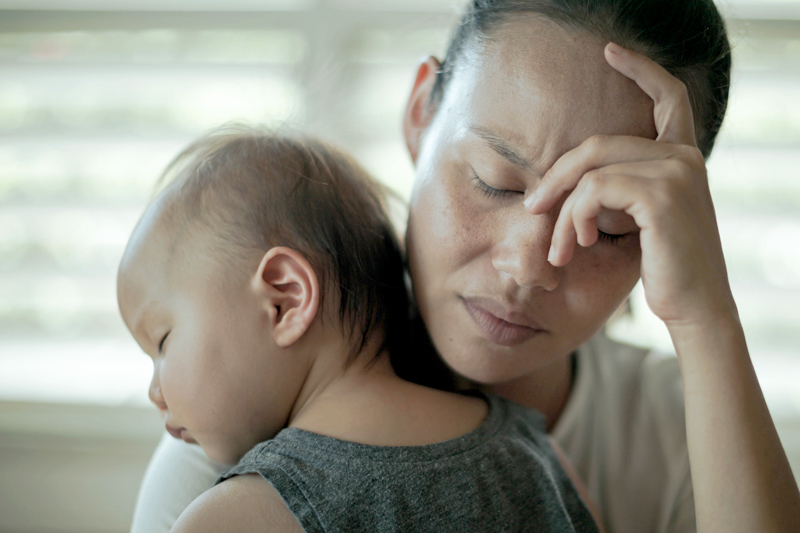There is a quiet but growing crisis unfolding in America.
It is the steady erosion of maternal mental health. New national data underscore what so many families and clinicians already know: U.S. mothers are struggling, and the supports meant to sustain them are lagging behind.

A recently published study in JAMA Internal Medicine offers a sweeping, sobering view: between 2016 and 2023, the percentage of U.S. mothers reporting “excellent” mental health dropped by more than 12 percentage points—from 38.4% to just 25.8%. Meanwhile, rates of fair or poor mental health saw a relative increase of 64% during the same period.
Much of the national conversation on maternal health has focused on pregnancy and delivery. But this new study, along with the 2024 U.S. Surgeon General’s advisory titled Parents Under Pressure, argues for a more expansive view—one that tracks parental health and well-being long after the postpartum period ends.
We know that the drivers of this crisis are many: limited access to affordable mental health care, chronic stress, economic instability, rising cost of living, racial and gender inequities, and a national shortage of perinatal mental health specialists. Compounding this further are the isolating effects of modern parenting—particularly for Gen Z and millennial mothers—and the disconnecting role of social media in shaping expectations and comparisons.
The COVID-19 pandemic did not cause this cliff, but it did accelerate the descent. According to the study in JAMA, mental health scores were already declining pre-2020, but the pandemic years saw a sharper increase in the proportion of mothers reporting poor or fair mental health.
Notably, mental health deterioration among mothers occurred across racial, socioeconomic, and insurance groups. But, the burden is especially heavy for single mothers, those with lower educational attainment, and those caring for children with public or no health insurance.
Key Findings and Disparities
- Maternal mental health disorders (MMHD)—ranging from postpartum depression and anxiety to OCD, bipolar disorder, and psychosis—affect roughly 1 in 5 women.
- Shockingly, almost 75% go undiagnosed and untreated, and rates of depression have doubled since 2010.
- Black and Indigenous mothers are disproportionately affected and less likely to receive treatment.
- Untreated MMHDs are linked to poor birth outcomes, higher healthcare costs, and increased risk of maternal mortality
- Data from the CDC’s Maternal Mortality Review Committees show that maternal mental health conditions, including suicide and overdose, are now the leading cause of pregnancy-related death in the United States.
- Risk factors extend beyond clinical symptoms: intimate partner violence, food insecurity, and overwhelming childcare burdens all amplify the risks.
These trends demand our attention—not just as a mental health concern but as a public health emergency.
Intergenerational Stakes
Poor maternal mental health has significant and long-lasting ripple effects. It increases the risk of preterm birth, impacts child development, and contributes to behavioral and emotional challenges in children. As the CDC notes, there is a “strong connection” between parental and child mental health.
In clinical and community settings, we see this every day. Mothers who are anxious or depressed often find it harder to manage basic parenting tasks, adhere to pediatric care plans, or maintain employment. In turn, this increases household stress and economic vulnerability—creating a feedback loop that harms both parent and child.
Policy Headwinds
These troubling trends in maternal mental health are unfolding against the backdrop of sweeping federal restructuring efforts that threaten to further destabilize the fragile infrastructure supporting mothers and families. Recent proposed changes at the U.S. Department of Health and Human Services (HHS) include deep budget cuts, workforce reductions, and the consolidation of key public health agencies—most notably, the demotion of the Substance Abuse and Mental Health Services Administration (SAMHSA) and the elimination of several maternal health-specific programs within HRSA and the CDC. Critical surveillance systems like the Pregnancy Risk Assessment Monitoring System (PRAMS) may be at risk, and technical assistance programs that support maternal mental health screening, peer support, and clinical integration are being scaled back. These moves jeopardize the very systems designed to detect, address, and prevent poor outcomes for mothers across the country.
Without immediate course correction, these cuts can only exacerbate the underlying crisis in maternal mental health—reducing access to data, eroding care coordination, and dismantling the specialized teams and leadership needed to champion perinatal mental health equity.
As suicide, overdose, and untreated mood disorders continue to rise among reproductive-aged women, the elimination of dedicated maternal mental health funding and leadership sends the wrong message at the wrong time. If we are serious about reversing these trends, protecting maternal mental health must become a core priority in federal behavioral health policy. Now more than ever, targeted advocacy is needed to restore, sustain, and scale the programs that make a difference.
What Needs to Happen Now!
Addressing this crisis requires structural changes and upstream investment. Based on the emerging data and evidence-based practices, we should strongly advocate for:
- Extending Medicaid postpartum coverage to 12 months (now optional for states under the American Rescue Plan), ensuring continuous access to mental health support beyond six weeks.
- Mandating universal screening for maternal mental health in both prenatal and pediatric care, using standardized tools (e.g., Edinburgh Postnatal Depression Scale (EPDS) or PHQ-9).
- Scaling culturally and linguistically responsive peer models, such as community-based doulas and lay health workers, to offer trusted support in underserved communities.
- Integrating behavioral health in OB-GYN and pediatric offices—leveraging collaborative care models and tele-mental health to close access gaps.
- Leveraging data and digital tools: EHR platforms, mobile apps, and AI-driven tools can prompt screening, monitor progress, and flag risk, enabling more proactive interventions.
From Crisis to Commitment
While many national conversations frequently focus on protecting unborn life, far less attention is paid to ensuring that mothers survive and thrive during and after pregnancy. This disconnect creates a dangerous gap in care and policy—one that contributes directly to preventable suffering and maternal mortality.
We can no longer afford to treat maternal mental health as an afterthought. The data shows us the scope of the problem; the human stories remind us of the cost of inaction. If we are serious about ending preventable maternal mortality, improving early childhood outcomes, and building a healthier society, maternal mental health must become a central focus of behavioral health, reproductive health, and public health policy.
Healthy moms raise healthy kids. It’s time to turn awareness into action and ensure that every mother has access to the care, support, and dignity she deserves.
Jorge R. Petit, MD, is a Behavioral Healthcare Leader, Author, and Founder/CEO of Quality Healthcare Solutions, LLC. Dr. Petit is also a long-time Board Member and past Chair of Mental Health News Education, the publisher of Autism Spectrum News and Behavioral Health News. For more information, visit his website: www.drjpetit.org, blog: Behavioral Health: Matters, LinkedIn: Dr. Jorge Petit, MD, or Substack: drjrpetit.substack.com.
References
- Daw JR, MacCallum-Bridges CL, Admon LK. Trends and Disparities in Maternal Self-Reported Mental and Physical Health. JAMA Intern Med. Published online May 27, 2025. doi:10.1001/jamainternmed.2025.1260
- Chen Y, Shiels MS, Uribe-Leitz T, et al. Pregnancy-Related Deaths in the US, 2018-2022. JAMA Netw Open. 2025;8(4):e254325. doi:10.1001/jamanetworkopen.2025.4325
- Policy Center for Maternal Mental Health. (2025, May). Maternal Mental Health Fact Sheet. https://policycentermmh.org/maternal-mental-health-fact-sheet/
- Diversity & Health Equity at APA. Fall 2024 Update




